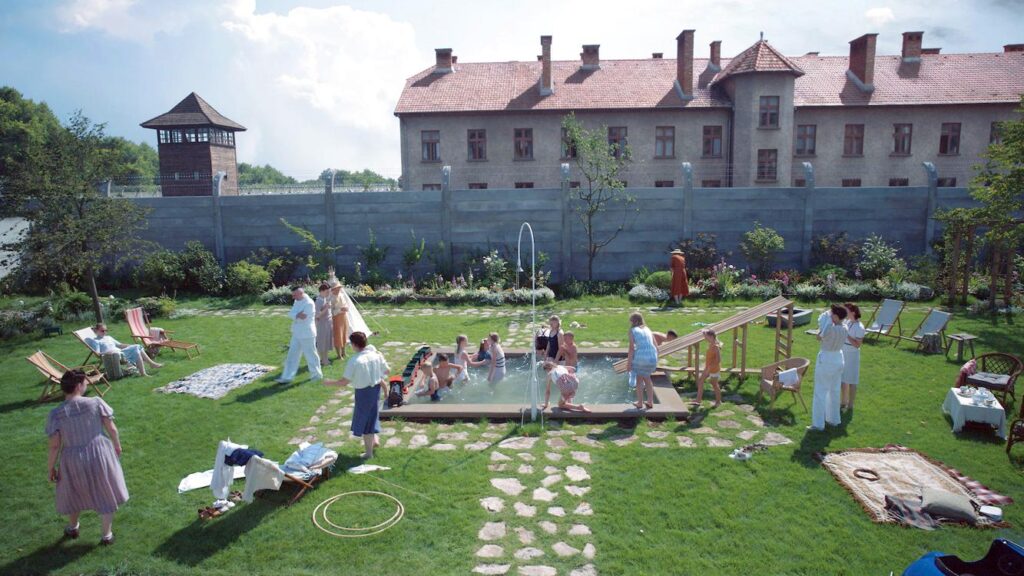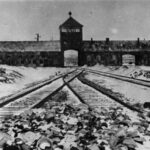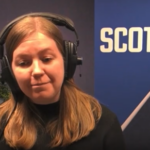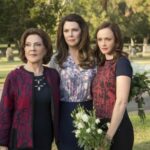Abortion, Historical Essays, Reviews
The Zone of Interest: God, Abortion, and Auschwitz
As a teen, I picked up a paperback copy of Commandant of Auschwitz: The Autobiography of Rudolf Höss at a thrift store and read it in two sittings. Written at the request of the Polish authorities before his execution by hanging in 1947, Höss describes his implementation of the Third Reich’s killing machine in banal and brutal detail, including the introduction of the use of the pesticide Zyklon B in the gas chambers. At his peak he was gassing and burning 10,000 Jews a day; in 1944, he supervised Operation Höss, the destruction of 430,000 Hungarian Jews in 56 days. It is a gut-wrenching read.
Two recent films have renewed interest in Höss. The Zone of Interest (2023) focuses on the walled Höss compound in the inner circle of Holocaust hell, where his wife Hedwig and their five children lived in a spacious villa with lush gardens and a pool—the title refers to the Nazi codename for the concentration camp complex. The camera focuses relentlessly on the Höss family; not once does it shift to the inferno roaring all around them. The children play, bicker, and listen to stories. Rudolf excitedly phones Hedwig to say that Himmler has complimented him. The Höss’s are social climbers, and they have it good at Auschwitz.
The Zone of Interest heightens the horror of the Holocaust by absence. Beyond the birdsong and buzzing insects in the garden are faint but discernible screams of women and children being driven to death by pesticide, the hoarse shouts of men, the sound of the trains. The blue sunlit skies often fill with ash falling softly onto scenes of domestic bliss. The family goes for a swimming excursion to a nearby river; a jawbone floats by, and the water suddenly becomes cloudy with murk—all that is left of entire Hungarian villages. By night, the glow of chimneys vomiting flame can be seen from the children’s bedroom windows. Hedwig’s mother visits but leaves because she cannot bear it.
One shot in particular burrows into the memory and sticks to the eyeballs. Höss is relaxing in bed; then, he is impassively watching as a transport of Jews is unloaded. It is merely another day at the office. The camera never leaves his face, but the sounds of human agony are all around him. We see it for just a few seconds, and then the camera cuts back abruptly to the Höss villa. It is almost unbearable to watch:
Contrast that with a jarring comment made by the 87-year-old Hans Jürgen Höss in the documentary The Commandant’s Shadow (2024): “I had a lovely time in Auschwitz.” The film follows Jürgen, one of the children portrayed in The Zone of Interest, as he struggles to accept and comprehend his father’s role in the murder of millions. He cannot reconcile his happy childhood memories with the truth about Auschwitz; his son Kai confronts him with evidence but initially struggles to penetrate Jürgen’s nostalgia. Jürgen meets with his elderly sister Brigitt for the first time in decades and she, too, cannot fathom the evil of her father or the complicity of her mother. At one point, Jürgen reads from the final letter he received from his father: “You’ll always be Daddy’s darling.”
Anita Lasker Wallfisch, who survived Auschwitz playing the cello as the transports were unloaded, is featured alongside her daughter Maya. Maya struggles to reconstruct her family’s past, and connects with Kai. Jürgen has never been to Auschwitz, and Kai asks him to go. They meet Maya in the synagogue in Oswiecim. They are silent for awhile. Then Jürgen says, in German: “I can only ask for forgiveness. That is all.” Shortly afterward, standing in the camp, the elderly man is overcome. “We knew him as a different person,” he says in a broken voice. “Is this how you imagined it?” Maya asks. “No,” he replies. “This is unimaginable.”
In a scene of extraordinary power, Anita agrees to meet Jürgen. He and Kai fly to London, and Maya lets them into the apartment. The survivor and the son shake hands. “A historic moment,” Anita says, shaking her head. “Who would have thought?” he replies. “Inconceivable,” she says. “The son of the commandant of Auschwitz sits in the home of Anita Lasker. How is this possible?” Jürgen appears unsure of what to say. “We live with the guilt,” he tells her. “You weren’t asked whose son you wanted to be,” Anita says. “Neither was I.” She asks him if, after having seen the camp, he hates or loves his father. Again, Jürgen struggles to answer. “Neither,” he said finally. “Otherwise, it would be unbearable.”
Much has already been written about these two films; they seem eerily timely in our climate of antisemitism. Anita mentions, at one point, that it still dangerous in the West for a boy wearing a kippah. The Commandant’s Shadow, in particular, is a reminder that Holocaust denial is vile and unfounded—Höss himself detailed his crimes, and specifically cited orders from Himmler and Hitler. But some aspects of the films have gone largely unremarked on.
In his review of The Zone of Interest, Andrew Klavan confessed to feeling guilt. Almost a million babies are killed in the womb every year, and although this is not the Holocaust, it is a great injustice. It is easy for us, like the Höss family, to carry on as if nothing is happening because we so rarely bear witness to the carnage—the crushed skulls, the dismembered limbs, the tiny faces suctioned into bloody slurry. We cannot stop the abortion machine, Klavan noted, but we must speak out and we must do something. Indeed, the only hero of the film appears in a handful of scenes, shot in night vision, of Alexandria Bystroń-Kołodziejczyk. As a girl, she frequently visited the camp by night, leaving food where starving prisoners could find it. A small thing, perhaps—but the difference between life and death for many.
Indeed, abortion was part of the Auschwitz horror. Eleonore Hodys arrived at the camp as a political prisoner on a transport in 1942. Being of “Aryan” descent, she was put to work in the Höss villa. Rudolf made her his sex slave, and she became pregnant. Seeking to avoid scandal, Höss sent her to be starved to death in a special “standing cell,” designed so that prisoners could not lay or sit. He ordered that she be gassed if the pregnancy was discovered; eventually, she was forced to have an abortion. Hodys testified against Höss at Nuremberg. It turns out that not all the Höss children survived Auschwitz. One died there to cover for his father’s crimes.
Perhaps the most moving subplot of The Commandant’s Shadow is the revelation that Kai Höss is an evangelical pastor at the Bible Church of Stuttgart. We see him hosting a Bible study, leading a group of men in prayer, discussing the need for Christian leadership, singing “How Great Thou Art” with all his heart. In one scene, Kai is preaching from Exodus 20:5-6, and he explains how he has struggled with God’s warning that He will visit “the iniquity of the fathers upon the children unto the third and fourth generation.” What does this mean for a Höss? Kai came to realize that the only answer was “the blood of the spotless Lamb of God.”
Therein lies the answer to all of the horrors raging in this dying world. The grandson of the commandant of Auschwitz bowed his knees to a Jewish Saviour, and now preaches to others from a Jewish book. And in one of the final scenes, we see his father Jürgen sitting with the congregation, listening.








